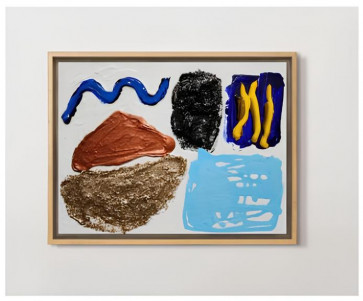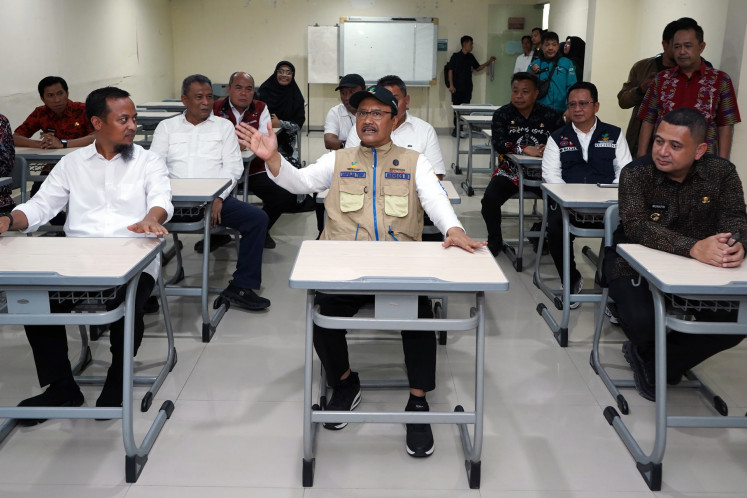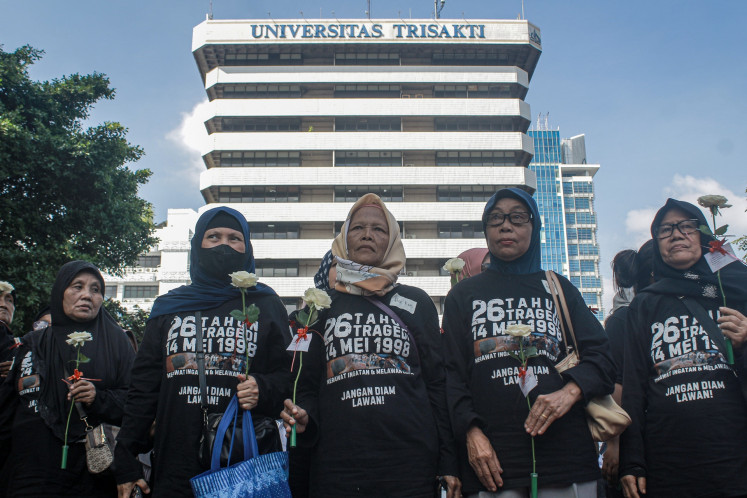Animation in the eyes of Jakob Schuh and Bastien Dubois
Bastien Dubois Jakob Schuh, AFP/Valerie MaconAlthough eventually losing out to Australians Shaun Tan and Andrew Ruhemann at the Academy Awards, the animators forged a friendship
Change text size
Gift Premium Articles
to Anyone

Bastien Dubois 
Although eventually losing out to Australians Shaun Tan and Andrew Ruhemann at the Academy Awards,
the animators forged a friendship.
Dubois and Schuh worked together for the first time when visiting Jakarta in November to teach at the Animation à Trois (Animation Three Ways) workshop, sponsored by the French Institute in Indonesia and the Goethe Institute.
Animation à Trois, held at the SAE Institute in Pejaten, South Jakarta, was attended by three selected Indonesian filmmakers: Dessy Tri Anandani Bambang, Hizkia Subiyantoro and Johan Tri Handoyo.

While the goal of the workshop was to help the local directors produce their own animated shorts, Schuh said that he and Dubois learned a lot from their Indonesian experience.
'If you teach people from your own cultural background, that's the usual thing to do. This is culturally different ' far away from home,' the 31-year-old said. 'In this kind of set up you learn just as much as the student.'
Neither Dubois and Schuh planned on working in animation, each pursuing other paths before finding their calling.
Dubois said he had been drawing since he was a boy, wanting to make comic books or video games. 'I was tired of programming video games after a while, but I was still drawing before I tried to do 3D animation.'
He studied at the Supinfocom computer graphics university in Valenciennes, France, to become an animator.
Dubois' first short, Madagascar ' Carnet de Voyage ' the one which earned him an Oscar nod ' was a 12-minute piece based on his sketch book/diary of a 10-month journey to the remote island nation. Similarly, Schuh had been drawing from a young age, eventually finding work as a newspaper cartoonist.
He also never thought of making animation a career. 'Animation was something you watched, not something you did,' Schuh said. 'For me, [it] was a thing that was done somewhere in America, and they made it with a magic wand.'
'I couldn't imagine I was actually doing that. The first time you see your drawings move, it was just amazing ' a great thing to witness. Then I got addicted,' the 38-year-old said.
Schuh studied at the Baden-Wuerttemberg film academy, where he has since been teaching for 12 years. While he founded Studio Soi with six fellow students, Schuh quit in January to focus on filmmaking.

His animated short The Gruffalo, adapted from a best-selling children's book in Europe, was broadcast by the BBC and nominated for an Oscar.
'Being nominated for Oscar was very nice, but it was also very bizarre,' Schuh said.
Dubois pipes in. 'But then life keeps on going as usual afterwards.'
The pair agreed that the nomination opened many new doors. Dubois, for example, said he had been contacted by several producers or directors about making full-length animated films.
'I'm currently working on the idea for my first feature film. I've been staying in north Yogyakarta, in the middle of a rice field, where my team and I can focus on working the script,' he said.
Meanwhile, Schuh, who cites The Jungle Book and Horton Hears a Who! as influences, says he'll stick with shorts, which are more fun to make.
'Animation is so much work,' Schuh says. 'The justification to want to do feature is that you have story that needs to be a feature because it's massive undertaking.'
Shorts also offer a greater chance of exposure, he said. 'If I make film for the BBC, it can be seen by 10 million people in one country. If I do it for cinema, it's almost impossible to get this number.'
Although saying that the work is fun, both men agree that animation is at times overwhelming and required people who were polymaths.
Dubois said that animators were required to draw, tell a story, edit, choose music, animate and be excellent with software to make a good film.
'Every little thing on the frame has to be made. It's sort of a wide array of task and sensibilities, but that's the good fun,' Schuh said .

Dubois and Schuh tried to bring that sensibility to their Indonesian students at the workshop, which focused on the pre-production process, especially script writing.
By the end of the program, participants are expected to produce their own animated films that will tell a story about a journey.
'What we're trying to do is to teach them not to be overwhelmed by images and ideas, but how to structure their ideas to shape a story,' Schuh said.
Hizkia Subiyantoro, one of the participants, said the workshop had helped him understand that there was more to prepare in making animation than just the visuals.
'Initially, we thought that things like story boarding and sound were not as important as the visuals. But we see it differently now,' he said.
Hizkia said that they would present their works to Dubois and Schuh online in January, discussing storyboards until they were solid enough to be made into a film.
'I'm targeting to finish the film by the end of next year,' said Hizkia, who plans to make a film about the life of truck drivers on the Pantura highway on Java's north coast.









